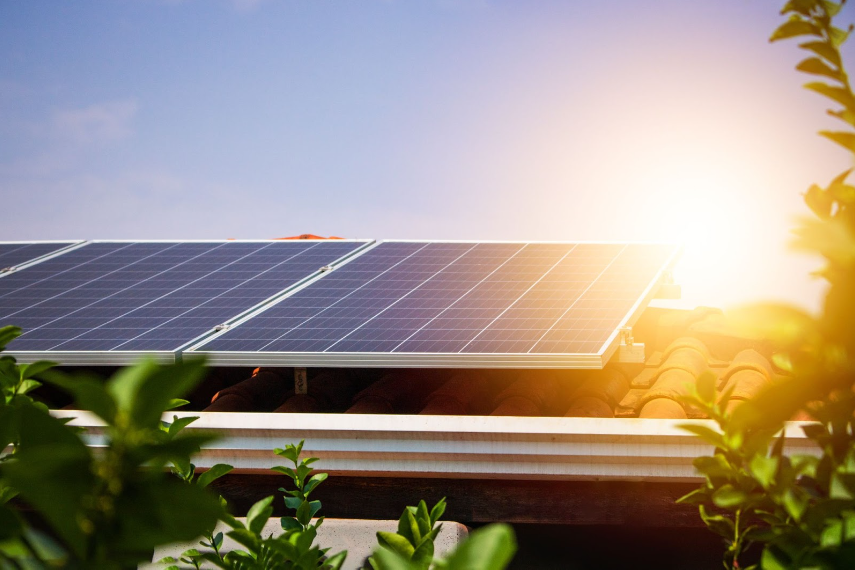Unlock monthly utility savings and lower carbon emissions in the new year
Embrace the benefits of solar energy in 2024 as we usher in a new era of affordability, sustainability, and financial gains. This year presents a prime opportunity to harness the power of the sun, unlocking substantial monthly utility savings while curbing carbon emissions.
Home solar energy not only slashes electricity bills significantly but also pays for itself over time, offering a solar payback period that ensures years of essentially “free” electricity. Explore the environmental advantages, government incentives, and the potential to increase your home value by investing in a solar energy system.
Discover why 2024 stands out as a pivotal year to join the solar revolution and propel your home into a greener, more economical future. Enact is the one-stop shop for clean energy consumers looking to go solar in the new year.

What are the benefits of home solar energy in 2024?
Home solar energy has many advantages that can benefit homeowners. Going solar is an investment that benefits your wallet and the planet. 2024 is a great year to go solar and take advantage of low solar prices, avoid high utility costs and benefit from government incentives.
Save money on utility bills
Home solar energy systems can significantly save money on monthly utility bills. By harnessing energy from the sun, solar panels generate electricity and reduce dependence on grid power. Over time, the savings on electricity bills accumulate as homeowners generate their power, reducing or eliminating the need to purchase electricity from the grid.
Additionally, some regions offer time-of-use billing, allowing solar-powered homes to capitalize on peak sunlight hours when electricity rates are typically higher. In some areas, excess energy produced during sunny periods can be fed back into the grid, earning homeowners credits or monetary compensation through net metering programs.
While the extent of savings depends on factors like system size, local energy rates, and sunlight availability, home solar energy systems are widely recognized as a cost-effective and environmentally friendly investment that contributes to long-term financial benefits for homeowners.
Solar pays itself off
Home solar energy systems save you money off your utility bills every month. As these savings add up, the money you save will exceed the original cost of your solar system. This is known as the solar payback period.
Enact customers see payback periods between 4-10 years, depending on the situation. The average lifespan of a solar energy system is 20-25 years. This means you can enjoy essentially “free” electricity for years.
Live environmentally friendly
Solar energy is a clean energy source, producing electricity without emitting carbon dioxide into the atmosphere. Most states in the U.S. rely on non-renewable energy sources for the majority of their power. Meaning if you draw electricity from the utility grid, your home is being powered by burning fossil fuels.
Solar panels rely on abundant sunshine to generate clean electricity without polluting our air or water supply. Custom solar panel systems can power your home with clean, renewable energy for decades. This can reduce your carbon footprint and help you lead a sustainable lifestyle that benefits your environment.
Government incentives ease the costs
The federal solar tax credit, also known as the Investment Tax Credit (ITC), is a dollar-for-dollar reduction in income tax owed. The ITC can be claimed on federal income taxes for 30% of the cost of a qualified residential solar system.
For installations completed between January 1, 2017 and December 31, 2034 — homeowners can claim the tax credit. As of 2022 — the credit is set at 30% of the installation costs. After 2032, this percentage slowly decreases. There is no maximum to the amount that can be claimed.
Homeowners are eligible if they own the solar energy system and the system is new or being used for the first time. The credit covers various expenses, including solar panels, contractor labor costs, balance-of-system equipment, storage batteries and sales taxes on eligible expenses.
Beyond the federal tax credit, other incentives like utility rebates and state tax credits can benefit homeowners. Some states, municipalities and utility companies offer incentives that can further ease the costs of going solar.
Increase your home value
Solar energy systems can significantly benefit homeowners by increasing the value of their homes. The installation of solar panels is considered a valuable home improvement that enhances property appeal and attracts environmentally conscious buyers. Homes equipped with solar energy systems are often viewed as more energy-efficient and cost-effective, appealing to a growing market of eco-conscious individuals.
Several studies have consistently demonstrated a positive correlation between solar installations and increased home values. Potential homebuyers recognize the long-term cost savings associated with solar power, as it reduces or eliminates electricity bills.
The environmental sustainability aspect of solar energy aligns with the preferences of modern homebuyers who prioritize eco-friendly features. As solar technology advances and becomes more mainstream, homes with solar panels are likely to enjoy a competitive edge in the real estate market. Investing in a solar energy system not only provides immediate financial benefits but also enhances the overall value and marketability of a homeowner’s property.
Why is 2024 a good year to go solar?
Going solar in 2024 is cheaper
Sunshine is free, however the technology to convert sunlight into electricity is not. Fortunately, the costs of solar panel technology are decreasing. Home solar energy systems have become more affordable thanks to increased demand, more supply, technological innovation and government incentives. Renewable energy is on track to become even cheaper.
The Inflation Reduction Act’s clean energy incentives, particularly the federal solar tax credit, led to a drop in solar panel prices, making them more accessible for American homeowners. The federal tax credit provides a decade of certainty, fostering industry growth and long-term investments. Despite temporary disruptions in solar prices due to supply chain issues, the overall trend of falling costs is anticipated to persist, driven by advancements in the solar industry.
Economies of scale and potential domestic manufacturing developments are expected to further reduce solar panel prices and address international supply chain challenges. Technological innovation and broader supply have contributed to lowering the price of solar.
Increasing cost of electricity
Consumers should expect the cost of electricity to continue climbing in 2024. Utility electricity prices are expected to rise in the new year, though at a lower rate than the previous two years.
Utility prices for electricity vary across the U.S. — for example, some Californians will see an increase that amounts to around $32.50 extra per month, starting Jan. 1, 2024. Other states that will see electricity in 2024 increases include Upstate New York, Connecticut, Oregon and Minnesota.
The rise of electricity prices every year is normal — however, the rate has rapidly increased — shocking consumers without time to react. The reasons for these increases include the increased cost of natural gas and oil, extreme weather and aging infrastructure. Fortunately, solar energy reduces your dependence on utility companies and fluctuating prices.
Home solar can help you save money on utility bills and shield you against fluctuations in prices. Enact customers have seen their utility bills significantly reduced or eliminated thanks to our custom solar system designs.
Government Incentives
As mentioned previously, the federal tax credit eases the financial cost of going solar. The Investment Tax Credit makes going solar easier for homeowners across the country, allowing homeowners to earn a dollar-for-dollar tax credit worth 30% of the installation and equipment costs for a qualifying system.
While the ITC has existed since 2006, the tax credit amount has changed. From 2017 to 2032, homeowners can earn a tax credit worth 30% of their system cost. After 2032, the credit will decrease. The ITC has brought stability for clean energy consumers for decades, which has helped lower the cost of solar panels and related equipment.
The solar tax credit will be around for a while — but the sooner you go solar, the more you can enjoy financial savings. Investing in solar can pay itself off in 4-10 years and last for 20-25 years. Don’t wait until to start your solar journey and take advantage of these incentives in 2024.

How can I go solar in 2024?
Schedule a free consultation
Schedule a free consultation with an Enact energy advisor to receive a personalized, custom quote for your home. The process involves providing essential information, such as your name, address and a copy of your last utility bill.
Based on your information, our advisors use the Enact solar platform to design a custom quote for your home. Using accurate satellite imagery, our advisors can remotely measure your roof, analyze sources of shade and make informative recommendations.
Submission of last month’s electrical bill helps your advisor understand your home’s energy usage and needs. During your consultation, make sure to mention if you plan to add an electric vehicle, electric appliances or other improvements that will affect your energy usage.
The consultation also covers various payment methods, including financing options with the flexibility of a down payment or the choice of a zero down payment. The conversation aims to educate homeowners about solar technology and payment preferences, fostering an informed decision-making process.
Get a free solar quote
During your consultation, Enact’s energy advisors will have drafted a custom solar estimate for your home. This quote will include an initial design, utility and financial estimates and outline the next steps. During your consultation, you can discuss the proposal and address and questions or concerns.
Enact customers have access to a variety of financial options – including upfront cash payments or financing options. Customers can find financing options from their provider or through Enact.
Technical Site Visit
Our team will work with you to schedule a time to have a qualified site technician come to your home. The technician will confirm the size and solar access of your rooftop. This step is important to ensure you get the right system for your home and determine your roof’s integrity.
If we find you need roof repairs or a new roof that incurs unwanted costs, you are free to walk away from the Enact experience.
Engineering & Design
After your technical site visit, the Enact team will compile the final designs and purchase agreement for you. Our team will work with you to finalize all of the details for your solar installation and answer any questions.
Permitting & Approvals
Our Project Operations Team will work to obtain all the necessary local permits and approvals to install and interconnect your new solar system. This involves working with your utility company and local government to ensure your system is safe and compliant.
Installation
A trusted local solar installation team will complete all civil and electrical work necessary to install your new solar system promptly. Enact works with preferred installer partners to ensure your experience is smooth and safe.
Testing & Approvals
We will coordinate all system inspections requested by the utility company and local electrical inspector. After your system is installed, local officials need to determine whether the system is safe — not only for your home but can safely integrate with the electrical grid.
Handover
Once your system is approved by local authorities, the fun part begins — your system will be turned on and power your home. Your Enact energy advisor will walk you through the process of turning on your system. After that, you can enjoy decades of utility savings and sustainable living.
Written by David Bartle, Content Marketing Associate.


